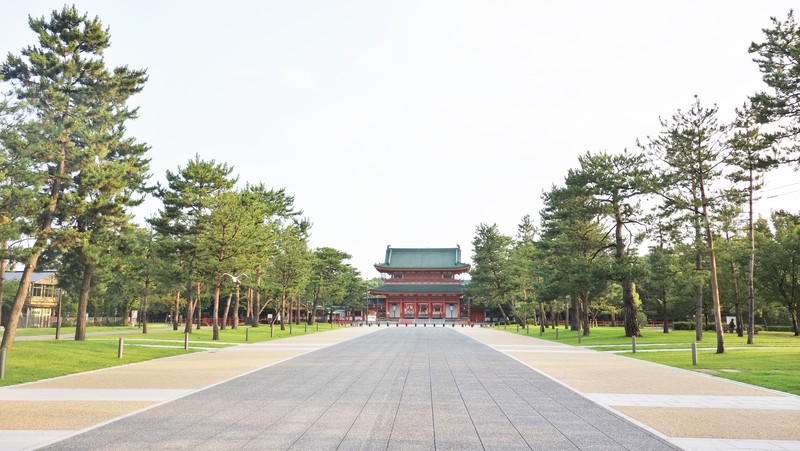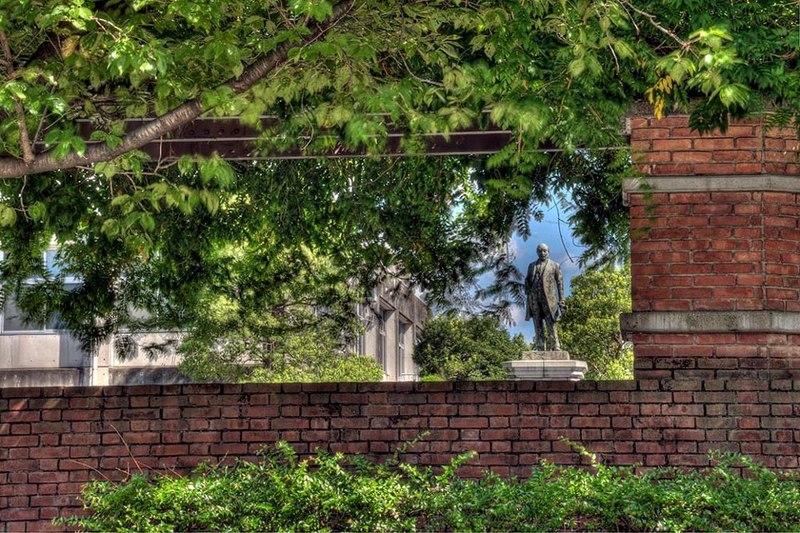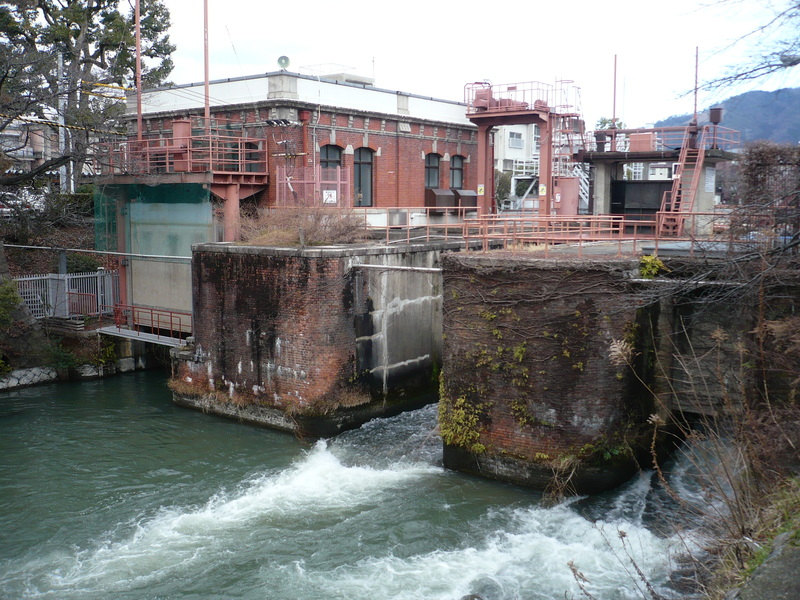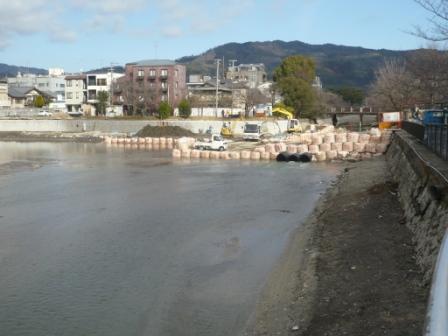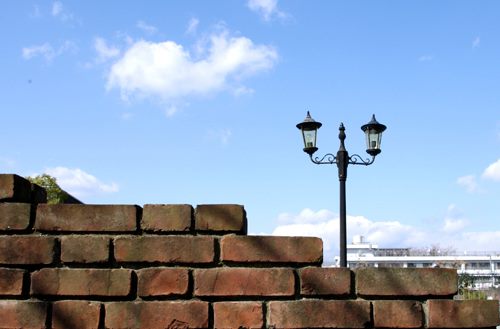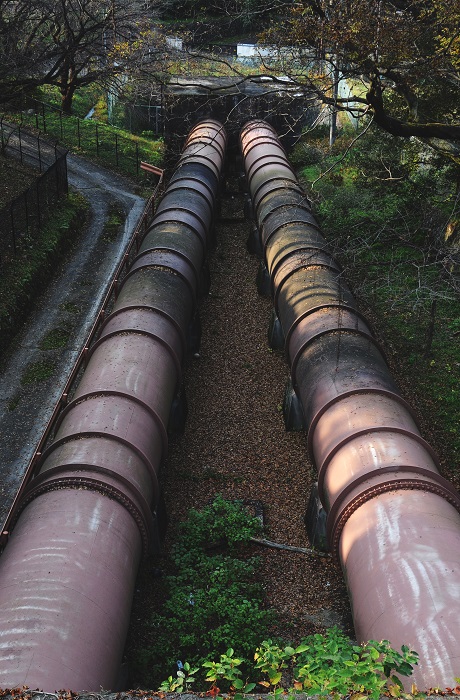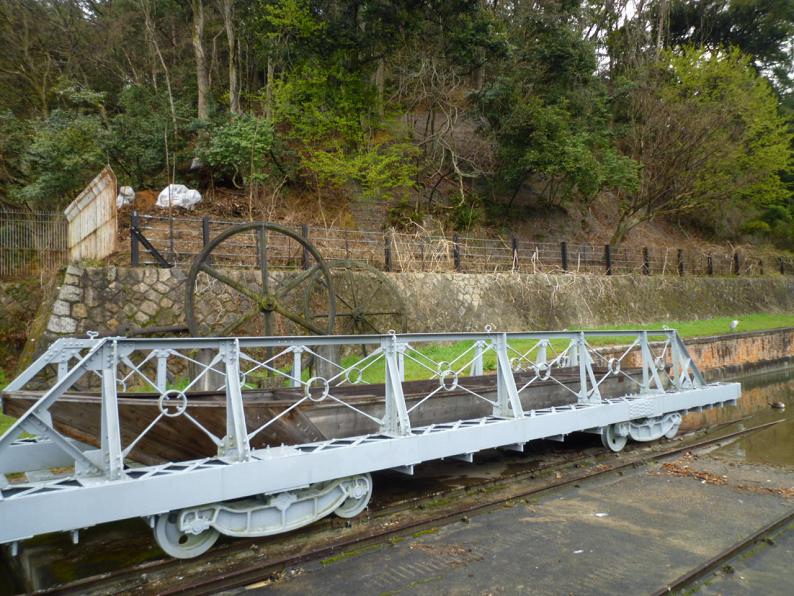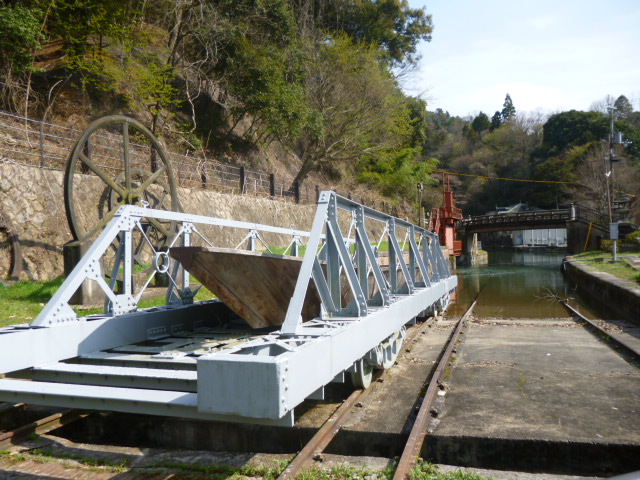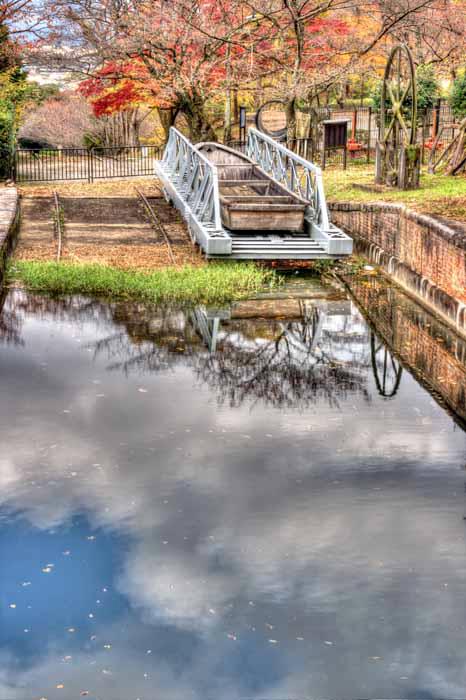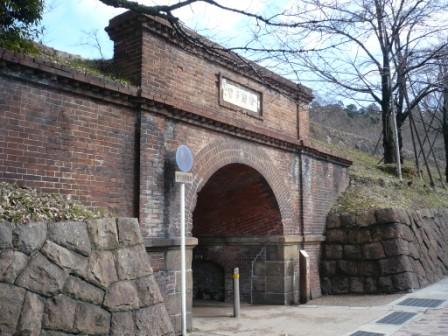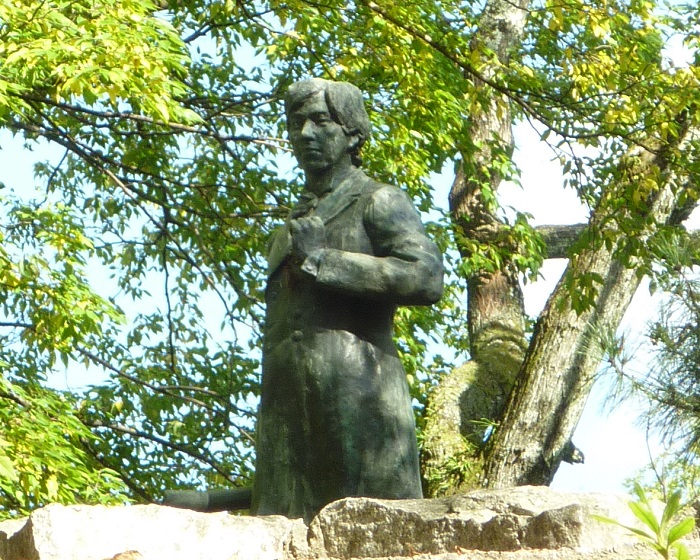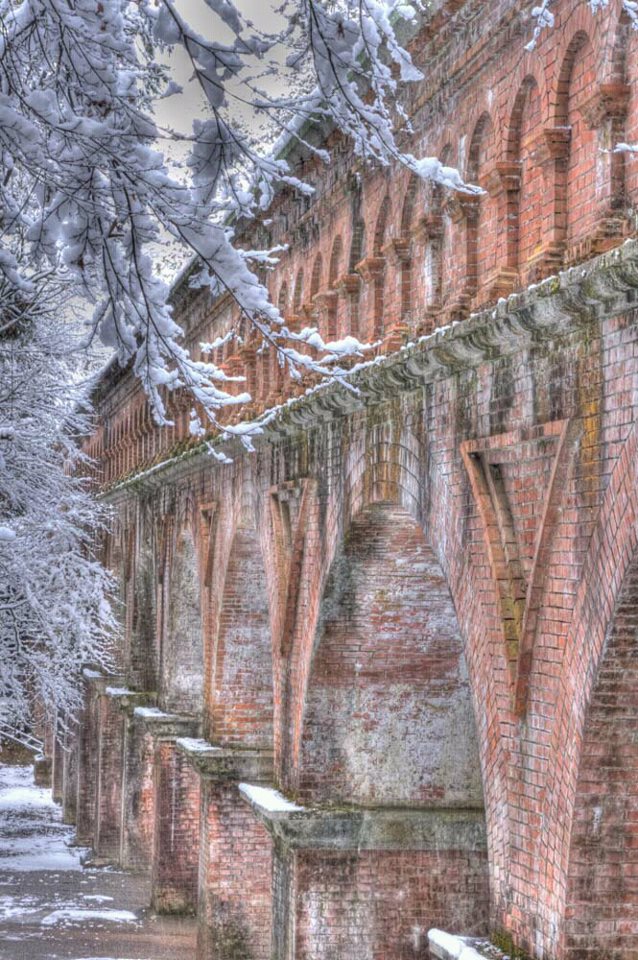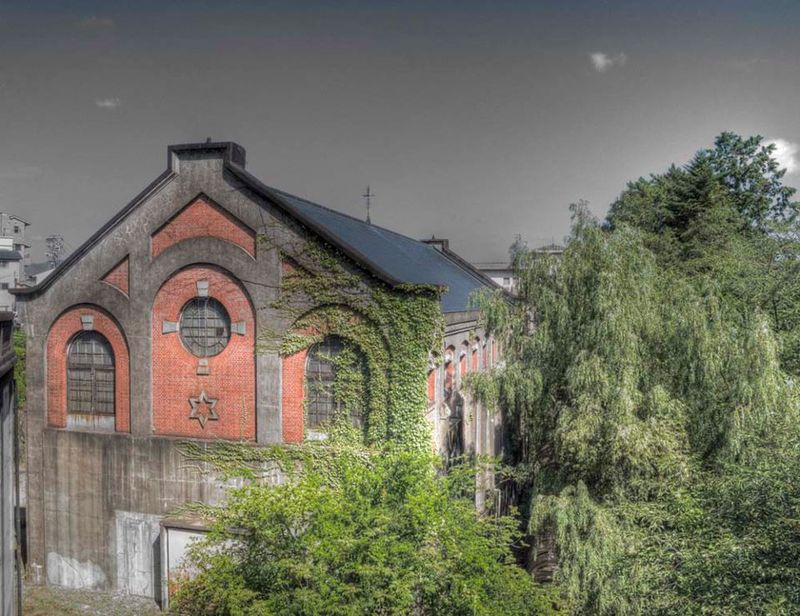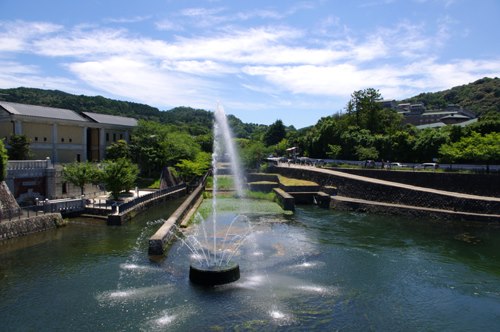岡崎公園
岡崎公園は、明治28(1895)年開催の第4回内国勧業博覧会跡地の一部を公園地として指定されたもので、京都市を代表する総合公園の一つです。公園内にある代表的な施設としては、京都市美術館、京都市動物園、琵琶湖疏水やインクライン、京都府立図書館などがあります。また、公園周辺には平安神宮をはじめ、ロームシアター京都、京都市勧業館みやこめっせ、京都国立近代美術館など、様々な文化交流施設が集積しています。
| お問い合わせ | ロームシアター京都 TEL:075-771-6051 FAX:075-746-3366 |
|---|---|
| ホームページ | http://rohmtheatrekyoto.jp/ |
| 所在地 | 〒606-8342京都市左京区岡崎最勝寺町他 |
北垣国道像
疏水建設に尽力した第三代京都府知事・北垣国道の像。明治35(1902)年に建てられた初代の像は、第二次世界大戦中の金属供出で撤去されました。現在の像は、平成2(1990)年に琵琶湖疏水竣工100周年記念事業のひとつとして再建された二代目です(台座は当初のもの)。
The Statue of Kunimichi Kitagaki
Here is Kunimichi Kitagaki, the 3rd governor of Kyoto who exerted himself for constructing the Lake Biwa Canal. The first statue made in 1902 was withdrawn and used as metals in World War 2. So this is second one remade through 100th anniversary of the Lake Biwa canal in 1990.
夷川発電所
市内への電力供給が始まって以降、電力需要は年々増加し、供給が追いつかない状況でしたが、明治45年に第二琵琶湖疏水が完成すると、発電用に十分な推量確保が可能になりました。そこで市は第一期蹴上発電所を廃止して第二期蹴上発電所を同年7月に運用開始。さらに大正3(1914)年4月にこの夷川発電所、5月に伏見発電所を新設し、電力供給量を大きく増やすことができました。運用開始時は英国製水車と米国製発電機を使用していました(今はどちらも国産)。
Ebisu-Gawa Power Plant
Since Kyoto City got connected to electricity, the power demand had been so greatly increased year after year that the supply could not catch up with it. In 1912 (Meiji 45), however, the second Lake Biwa canal was completed to enable the power plant to ensure water enough for generation, and so the municipal authorities started to operate Keage second power plant in July, stopping Keage first power plant. Subsequently, they established this Ebisu-gawa power plant in April 1914 (Taisho 3) and Fushimi power plant in May, which increased the power supply dramatically. There, at that time, were British water turbines and American generators used (but now they both has been replaced by domestic ones).
夷川船溜 京都踏水会游泳場
昭和初期の夷川船溜は水の透明度も高く、オイカワ・シジミなどの魚介類が多く生息するよい環境でした。明治29(1896)年に大日本武徳会游泳部が創設されて以来、昭和46(1971)年に水泳体育館(プール)が完成するまで、京都有数の水泳場として長らく親しまれ、75年間でのべ50万人以上が水泳講習を受けました。
Ebisu-Gawa Boat Reservoir (Tosuikai pool)
In the beginning of Syowa age, Ebisu-GawaBoat Reservoir had clear water, and good environment. There were many fish and shellfish, freshwater minnows and basket clams. In 1896( Meiji 29 ), the Dai Nippon Butoku kai swimming club was founded, and after that, it was popular among many people as the foremost pool until the pool gym was completed in 1971 (Showa 46). A total of 50 thousands or more took a swimming class here in 75 years.
夷川船溜
明治23年4月9日の琵琶湖疏水竣工式はこの夷川船溜で行われました。また南禅寺船溜等と並んで、京都有数の水泳場として長らく親しまれました。明治35(1902)年には北垣国道像が、大正3(1914)年には夷川発電所がそれぞれ完成しています。両岸の桜回廊が美しく、毎年春に運航する岡崎さくら・わかば回廊十石舟めぐりの折り返し地点。
Ebisu-Gawa Boat Reservoir
It is exactly at this Ebisu-gawa ship reservoir that the ceremony to celebrate the completion of Biwa lake canal was held on April 9, 1890. Ranked with other ship reservoirs such as Nanzenji’s one, this place was known as one of the few swimming-places in Kyoto. The statue of Kunimichi Kitagaki and power plant completed these construction in 1902 and 1914 repeatedly. We can appreciate the corridors of cherry blossoms on both banks and this place is chosen as the turning point of Jukkoku-fune boat on which we can travel around the corridor of cherry blossoms and young leaves in Okazaki every spring.
巻上機
蹴上船溜には、復元運輸船とあわせて、巻上機(現物)が展示されています。踏切跡で引き返す人も多いようですが、少し足を伸ばすだけでこんな貴重な展示が見られます。マニアならずともオススメ。
A Windlass
At the bank of Keage anchorage, we can see not only a restoration of troopship, but a windlass (an actual thing) exhibited. It seems that many visitors turn back at the track of grade crossing, but a few minutes takes you to such precious exhibition. Why don’t you going even if you are not familiar with it.
(英文翻訳:京都府立大学欧米言語文化学科)
復元運輸船
インクラインの2箇所に、復元した運輸船が台車に載った状態で展示されています。実際にこの急な傾斜を船荷ごと台車で上げ下げしたことを思うと、当時「船、山を登る」と珍しがられて観光名所となった逸話も納得。“大正広重”と呼ばれ鳥瞰図で知られる吉田初三郎が描いた「京都」(昭和3年刊)を見ると、急傾斜を船が行き交う様子が誇張して描かれており、当時の注目度がしのばれます。
旧御所水道ポンプ室
第三トンネル出口にあるポンプ場で、九条山貯水池に送水するポンプがあります。京都国立博物館を設計した片山東熊によるネオ・ルネッサンス様式の建物で、明治45(1912)年に完成。蹴上船溜周辺から遠望できます。
蹴上船溜
インクラインの上端にあたる船溜(ふなだまり)。日向大神宮(ひむかいだいじんぐう)の参道とクロスしており、第一疏水の第三トンネル、第二疏水合流口、ポンプ場、運輸船の復元展示と説明などいくつもの見所が集まっています。
Keage Boat Reservoir
This boat reservoir is at the upper end of the incline. It crosses the approach to Himukai Shrine. And there are many spots of interest near this place: for example, the third tunnel of the first Sosui canal, the junction of the second Sosui canal, pumps, the exhibition of restored carriers and so on.
(英文翻訳:京都府立大学欧米言語文化学科)
ねじりまんぽ
地下鉄東西線蹴上駅を地上に上がってすぐのところにある歩行者用トンネル。上からの大きな負荷に耐えられるよう、ねじったように斜めにレンガを積んであります。「雄観奇想」「陽気発所」と刻まれた扁額は粟田焼きで、揮毫は第三代京都府知事・北垣国道。
Spiral Brick Tunnel
This is the tunnel for walker near Keage station on the Tozai Line which is Kyoto Municipal Subway line. This tunnel is made of bricks. In order to bare the heavy weight, bricks are laid diagonally, as if the tunnel is twisted. There are 2 potteries – plates on the wall of the beginning and the end of the tunnel. These plates are made as ‘Kurita Yaki’ which is one of the most marvelous brands of pottery in Kyoto. An idiomatic expression was marked on the each plate. These marks are composed of 4 kanji written by Kunimichi Kitagaki who was the 3rd governor of Kyoto. One idiom means ‘an amazing view or thought’, and the other idiom means that we can do anything with our concentration.
(英文翻訳:京都府立大学欧米言語文化学科)
田邊朔郎像
江戸に生まれ、工部大学校(現東京大工学部)に在学中に論文『琵琶湖疏水工事の計画』を執筆した田邊朔郎(たなべさくろう)。23歳にして琵琶湖疏水工事の総責任者に抜擢され、さまざまな難問題をクリアし、世紀の難工事を見事にやりとげました。銅像は、昭和57(1982)年に京都華頂ライオンズクラブが京都市に寄贈したものです。
The statue of Tanabe Sakuro
This is Tanabe Sakuro. He was born in Edo, and wrote a thesis about “the plan of the Lake Biwa sosui canal construction work” while still a student of Imperial college of Engineering. When he was twenty three, he was nominated for chief engineer of the construction work. As he overcame the various difficulties, he completely finished one of the most difficult construction works of the century. The statue was donated to Kyoto city by Kyoto Kacho Lion’s Club in 1982.
(英文翻訳:京都府立大学欧米言語文化学科)
水路閣
疏水分線に水を通すためにつくられた高架水道橋。延長93.17m、幅4.06m。レンガを用いたアーチ構造のデザインは当時斬新で「景観を損なう」と批判する人も多かったとか。今では経年変化によって味わいが増し、京都を代表する人気の観光名所となりました。紅葉の名所、カメラスポットとしても有名です。
Suiro-Kaku Aqueduct
Suiro-kaku aqueduct is an elevated water bridge which was made to open the branch canal. It is 93.17 meters long, and 4.06 meters wide.The brick, arch-shaped design was novel for people in those days; quite a few people criticized it because they thought it would spoil the view. Now, however, Suiro-kaku aqueduct has gained its unique charm as years passed to become one of the most popular tourist spots in Kyoto. It is famous for the beautiful autumn leaves, and also known as a good photographing spot.
(英文翻訳:京都府立大学欧米言語文化学科)
第二期蹴上発電所
琵琶湖疏水は、当初予定になかった水力発電をもたらしました。明治21(1888)年にアメリカ・アスペンで世界初の水力発電が成功したことに触発されたもので、日本初の事業用水力発電所が明治24(1891)年に完成しました。明治45(1912)年に完成した第二期蹴上発電所は、今も粟田口の交差点やインクラインから、往時を伝える外観を見ることができます。
The Second Keage Hydropower plant
The Lake Biwa sosui canal brought the unexpected hydropower. The first electric utility hydropower plant, which has inspired by the world’s first hydropower in Aspen, Colorado in 1888, was completed in japan in 1891. From an intersection in Awata-guchi and an incline, you can see the outside of the second Keage hydropower plant completed in 1912, which has some traces of the past time.
(英文翻訳:京都府立大学欧米言語文化学科)
南禅寺船溜
インクライン下端の船溜(ふなだまり)。琵琶湖疏水記念館、旧インクライン機械室、噴水、白川合流点など、疏水関連の見所がいっぱい。中央にある噴水は、琵琶湖疏水の高低差による水圧だけで噴き上がるナチュラル噴水。電気などの動力を必要とせず、昼夜を問わず動き続けています。


